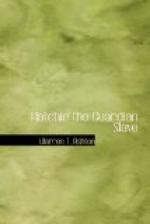Henry Carroll, with a melancholy heart, witnessed the process of conveying these boxes to the deck of the steamer. In them was all that remained of many stout hearts, with whom, side by side, he had marched to glory and victory. There were the forms with whom he had triumphantly mounted the battlements at Vera Cruz, and raised the stars and stripes over the city of Mexico. There, before him, forever silent, were the dead heroes of Chepultepec and Perote. Those with whom he had endured toils and hardships of no common nature,—with whom he had contended against a treacherous foe, and a more treacherous climate,—were there encoffined before him. They died in defence of their country’s honor; and he almost envied them the death which wrote their names, subject to no future stain, upon the roll of fame.
The sight of these boxes, and a knowledge of their contents, also awakened sad reflections in the mind of Uncle Nathan. But his reflections were of a different character from those of the soldier. War he regarded as an unnecessary evil,—one which men had no more right to countenance than they had the deeds of the midnight assassin. The honor of a nation were better sacrificed than that the blood of innocent men should flow in its support. He was a thorough disciple of the peace movement. With such views as these, his sympathies naturally reverted to the dwelling of the departed hero; to the home rendered desolate by the untimely death of a father; to the circle which gathered in tears around the fire-side, to deplore the loss of an affectionate brother and son; to the widow and the orphan, whom war’s desolating hand cast into the world to tread alone its dreary path. To Uncle Nathan victory and defeat were alike the messengers of woe. Both were the death-knell of human beings; both carried weeping and wailing to women and children.
After the last box of the pile had been conveyed on board, and preparations were making to cast off, the reflections of hero and moralist were disturbed by several long, loud vociferations, in a strong Hibernian accent. They proceeded from a man, dressed in the tattered remnants of the blue army uniform, who was industriously propelling a wheel-barrow towards the landing, on which was a box of similar description to those just embarked.
“Hould on!” shouted he; “hould on, will yous, and take on this bit of a box?”
“Does it belong with the others?” asked the captain.
“To be sure it does,” replied Pat. “What the divil else does it belong to? Arn’t it the body of Captain Farrell, long life to his honor! going home to see his frinds?”
“Take it aboard,” said Captain Brawler to the deck hands, after examining the direction.
The men lifted the box rather rudely, in a manner which seemed to hurt poor Pat’s feelings.
“Bad luck to yous! where were you born, to handle the body of a dead man the like o’ that?” said he. “Have yous no rispict for the mim’ry of a haro, that yous trate his ramains so ongintlemanly? Hould up your ind, darlint, and walk aisy wid it!”




